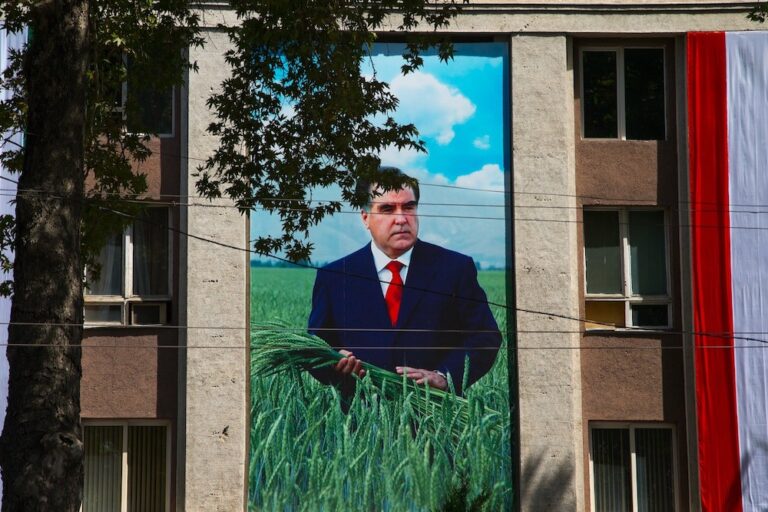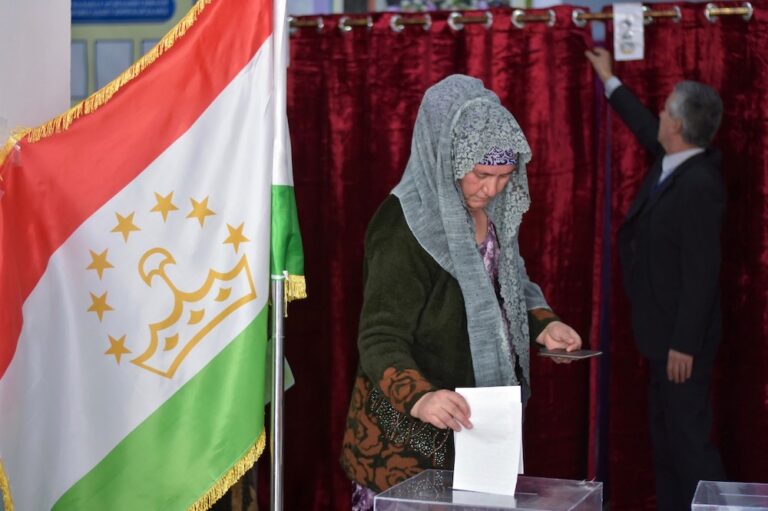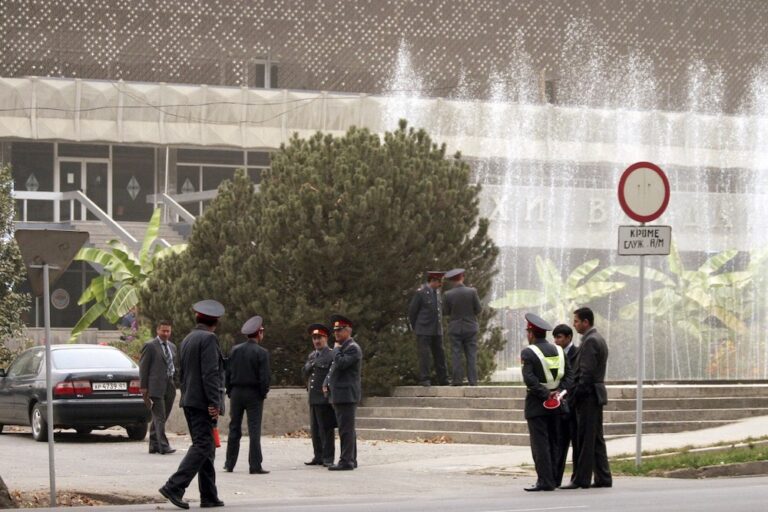(CPJ/IFEX) – The following is an 8 May 2002 CPJ press release: TAJIKISTAN: CPJ sends letter to foreign minister requesting information on press freedom abuses New York, May 8, 2002-In a letter sent to Tajik foreign minister Talbak Nazarov today, CPJ requested information about several cases of press freedom abuses by the Tajik officials and […]
(CPJ/IFEX) – The following is an 8 May 2002 CPJ press release:
TAJIKISTAN: CPJ sends letter to foreign minister requesting information on press freedom abuses
New York, May 8, 2002-In a letter sent to Tajik foreign minister Talbak Nazarov today, CPJ requested information about several cases of press freedom abuses by the Tajik officials and made recommendations for improving conditions for journalists in the country.
The letter came in response to an April 19 meeting that CPJ conducted with Tajikistan’s United Nations ambassador Rashid Alimov and the foreign minister, who committed to reviewing a letter outlining CPJ’s concerns.
CPJ asked the minister to investigate cases of government harassment of journalists, intimidation, murder, censorship, and bureaucratic obstacles that stifle the independent media in Tajikistan.
“We are encouraged by Minister Nazarov’s willingness to open a dialogue and examine these serious press freedom issues,” said CPJ Europe and Central Asia program coordinator Alex Lupis. “We hope that this letter will lead to substantive improvements for journalists in Tajikistan.”
For more information about Tajikistan, visit www.cpj.org. CPJ is a New York-based, independent, nonprofit organization that works to safeguard press freedom around the world.
END
The following is the text of CPJ’s letter to Tajik Foreign Minister Talbak Nazarov:
May 8, 2002
Foreign Minister Talbak Nazarov
C/o Ambassador Rashid Alimov
Tajikistan Mission to the United Nations
136 East 67th Street
New York, N.Y. 10021
Via facsimile: (212) 472-7645
Your Excellency:
Joel Simon and I enjoyed the opportunity to meet with you and Ambassador Rashid Alimov on April 19 to discuss press freedom conditions in Tajikistan.
We very much appreciate Your Excellency’s commitment to review a letter from us outlining our concerns and a number of press freedom cases we have documented.
Unfortunately, government harassment, intimidation, and censorship regularly stifle press freedom in Tajikistan. The political factionalism that erupted during the 1992-1993 civil war, as well as the murders of many journalists killed during the conflict, has lead to widespread self-censorship.
CPJ has been documenting these abuses in Tajikistan since the country’s independence in 1991. We are pleased to have this opportunity to communicate our findings and recommendations directly to the government and are hopeful that your personal interest in this matter will lead to an improvement in press freedom conditions.
Below, we have outlined five press freedom issues we would like Tajik authorities to address.
1. Government officials continue to intimidate and attack journalists with impunity, even though Article 162 of the Tajik Penal Code criminalizes obstructing a journalist’s professional activities. Most incidents come in retaliation for reporting on sensitive issues such as the military, organized crime, drug trafficking, official corruption, opposition parties, and criticism of politicians and government officials.
Since 1992, CPJ has documented eight such cases. Here, we have highlighted two of particular concern:
a) In July 2001, the Tajik government attempted, unsuccessfully, to have Dododjon Atovullo, exiled publisher and editor of the Tajik opposition newspaper Charogi Ruz, extradited from Russia. He was charged with sedition and insulting the president in retaliation for criticizing your government in articles published in his paper.
b) On June 14, 2001, officials from the State Security Ministry questioned and threatened Khrushed Atovulloyev, a reporter with the newspaper Dzhavononi Tojikiston, in retaliation for a June 8 article describing abysmal living conditions endured by university students and bribe-taking by teaching staff.
2. The printing industry remains under strict government control, allowing little or no room for independent papers to be published freely. The state-run Sharki Ozod printing house-run by Manzurhon Dodohonov, whom President Imomali Rahmonov appointed-continues to censor articles or publications that criticize the government, despite the fact that Article 36 of the Tajik Law on the Press and Other Mass Media outlaws such censorship.
We have documented four cases of censorship, including two of particular concern below.
a) In mid-October 1999, the private weekly Jubish, which had reported on the views and activities of the Islamic United Tajik Opposition and other opposition parties, was forced to cease publication because the Sharki Ozod printing house refused to publish the paper.
b) On November 13, 1997, Sharki Ozod refused to print the Russian-language weekly newspaper Vecherniye vesti after it had published a November 6 front-page interview with opposition leader and Deputy Prime Minister Abdumalik Abdullajonov. Abdullajonov was running against President Rakhmonov in elections that took place in November 1999.
3. Independent radio and television remains stifled. The Ministry of Communications and the State Committee for Television and Radio both routinely deny independent television and radio stations broadcast licenses. The Asia Plus news agency and Radio NIS, for example, applied for broadcast licenses in August 1998, but they have not been granted. Meanwhile, when outlets are able to secure a license, officials sometimes charge excessive fees, up to 4.65 million Tajik rubles (US$3,000), and only grant short-term licenses, according to local press reports.
As a result of this policy, there are no independent television or radio stations in the capital, Dushanbe. Radio Tiroz, a local station in the northern city of Khundand, is the only independent radio station in the country. The nominally independent radio stations Somonien and Potakht in Dushanbe, meanwhile, are run by individuals loyal to Dushanbe mayor Mahmadsaid Ubaidullaev, according to local CPJ sources. Fifteen independent television stations operate in Tajikistan, but most are located in the north, far from large population areas and with very limited audiences.
We are particularly concerned that the State Committee for Television and Radio is seeking to restrict the content of programming broadcast on independent television stations. The committee sent a February 19, 2002, letter to independent television stations instructing them not to broadcast programs that are not produced by the stations themselves, according to local CPJ sources. Because most stations don’t have the funds to produce their own shows, they often rebroadcast shows from other countries, including Russia. This new policy will severely restrict the amount of material available for broadcasting and will jeopardize the stations’ financial well-being.
4. The Tajik Penal Code criminalizes defamation and insult laws. Article 135(2) stipulates that “distribution of obviously false information defaming a person’s honor, dignity or reputation” is punishable by up to two years in jail; Article 136(2) stipulates that “insult, that is, the abasement of honor and dignity, expressed in an indecent way, is punishable by…up to two years in correctional labor”; Article 137 stipulates that “publicly insulting the President of the Republic of Tajikistan or slander addressed to him” is punishable by up to five years in jail.
As head of state, President Rakhmonov is at the center of public debate and, therefore, must tolerate public scrutiny, including harsh criticism. Members of the media cannot fulfill their role as long as the government has the power to designate critical reporting “offensive” and criminally prosecute journalists for their work.
There is an emerging international consensus that such laws are in inimical to press freedom; civil remedies provide adequate redress in instances where public officials allege they have been defamed.
5. A large number of journalists were murdered during and after the civil war in Tajikistan. CPJ has documented 19 cases since 1992. Below, we’ve outlined two of particular concern.
a) Khushvakht Haydarsho, secretary of the editorial board of the Tajik-language government newspaper Jumhuriyat, was shot dead near his home in Dushanbe on May 18, 1994. Local journalists believe his murder was connected to a series of articles he had published on “the criminal and political mafia” in Tajikistan.
b) Viktor Nikulin, a correspondent for Russian Public Television (ORT) in Dushanbe, was fatally shot at the door of his office on March 28, 1996. He had received three threatening telephone calls a week before he was killed. Nikulin had reported extensively on drug trafficking in the country, ORT reported.
In light of the above findings, we would like to:
a) Receive information regarding any investigation into cases of government officials harassing journalists;
b) Receive information regarding any plans your government may have to end censorship at the state-run Sharki Ozod printing house;
c) Encourage you to allow private individuals to establish independent printing presses and request a clarification of your government’s policy on this matter;
d) Receive information about any plans your government may have to improve the conditions for independent radio and television stations;
e) Receive information about any plans your government may have to decriminalize libel laws and eliminate insult laws; and
f) Receive information about the current status of the investigations and prosecutions of cases of murdered journalists.
We will contact you in the near future to set up a meeting to discuss these five press freedom issues. We look forward to the meeting and hope to be able to continue this dialogue in the future.
Sincerely,
Alex Lupis
Europe and Central Asia Program Coordinator
Recommended Action
Appeals can be sent to:Foreign Minister Talbak Nazarov
C/o Ambassador Rashid Alimov
Tajikistan Mission to the United Nations
136 East 67th Street
New York, N.Y. 10021
Fax: +1 212 472 7645Please copy appeals to the source if possible.


